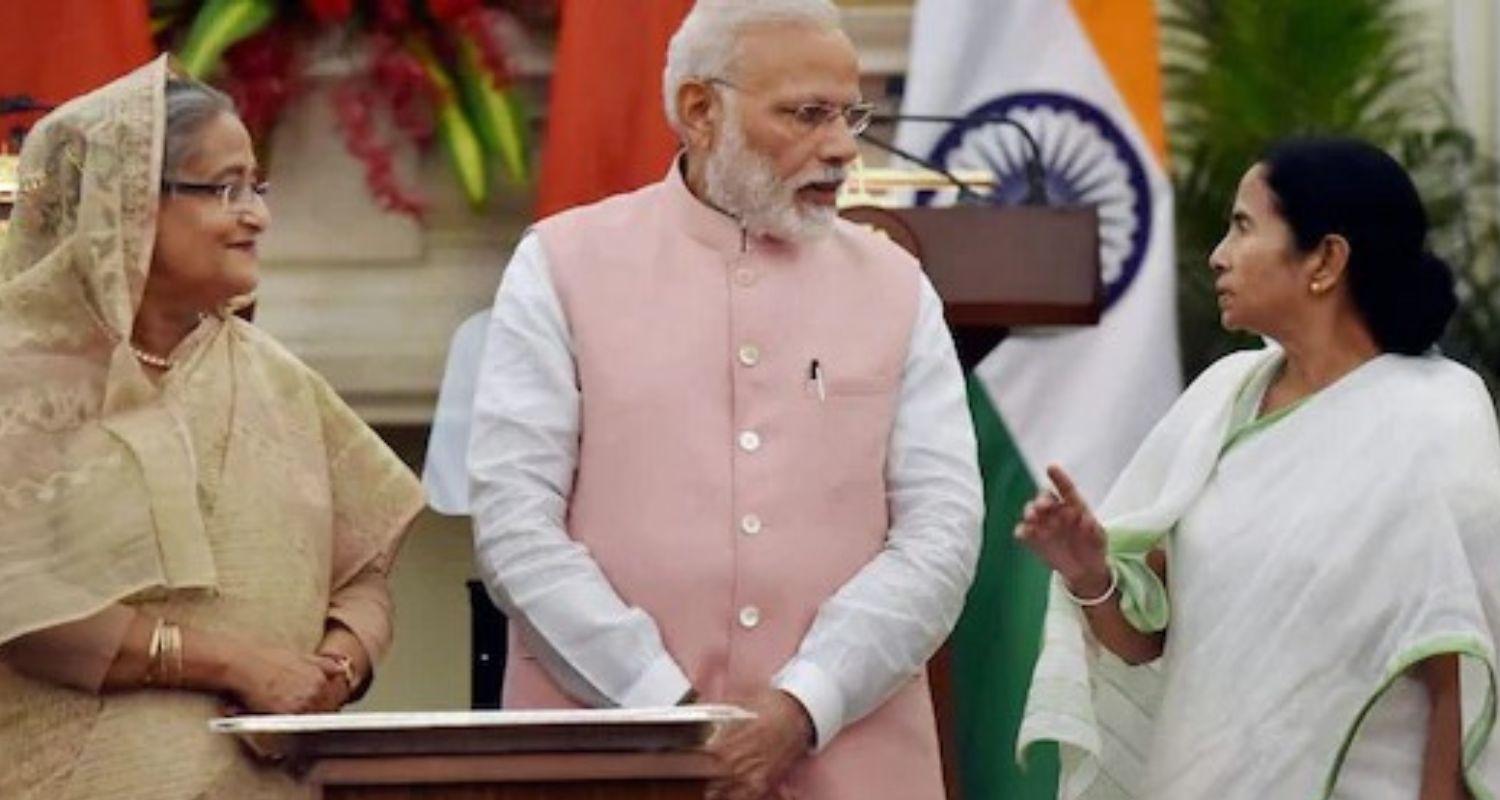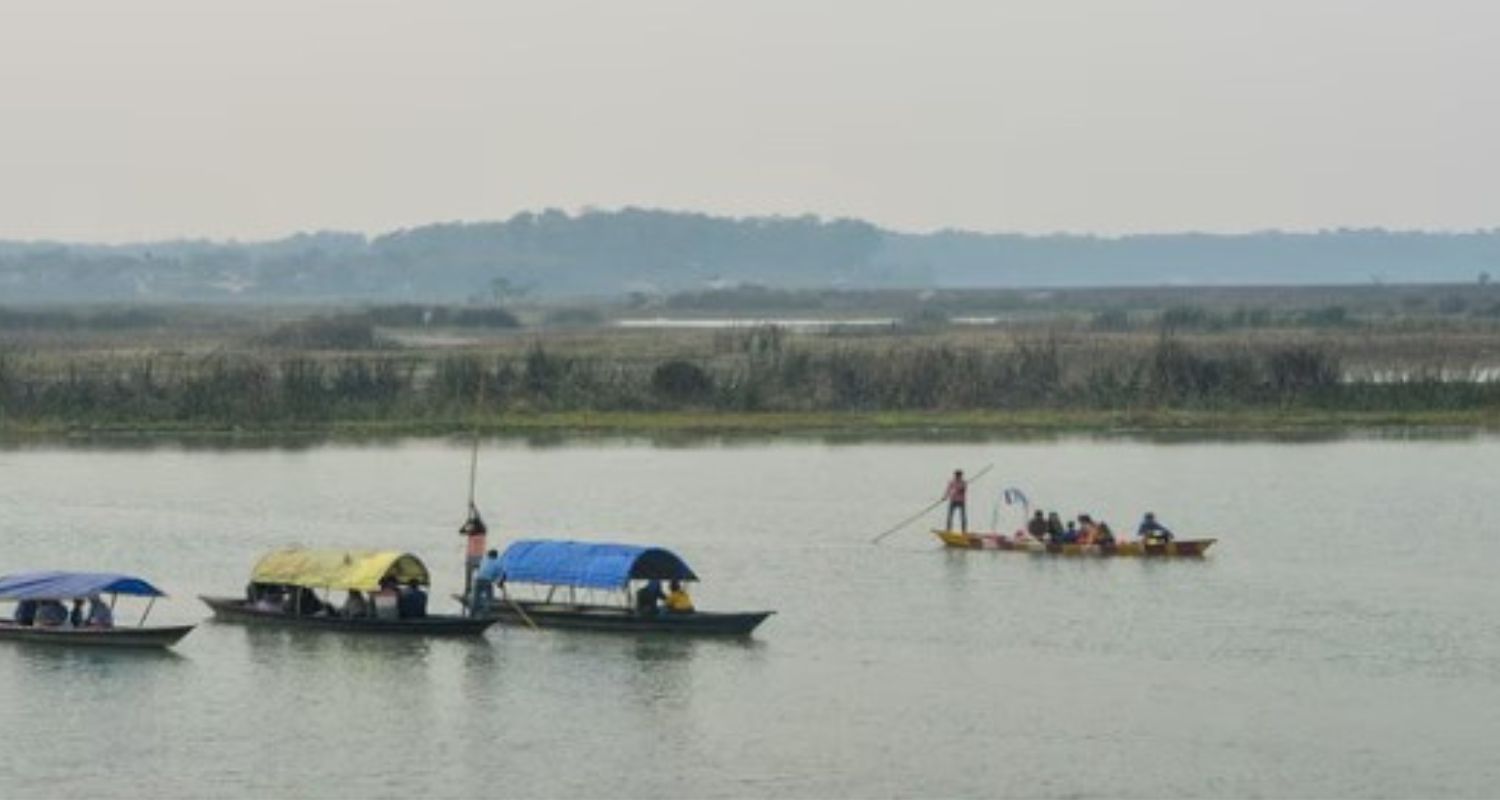Trending:
Why Teesta & Ganga treaties leave Mamata upset?
West Bengal chief minister Mamata Banerjee expressed anguish for not being included in the discussions with Bangladesh. However, the Centre has rebuffed her claims of not being consulted over the issue.News Arena Network - New Delhi - UPDATED: June 25, 2024, 04:59 PM - 2 min read

West Bengal CM Mamata Banerjee has expressed anguish over water-sharing talks between PM Narendra Modi and his Bangladeshi counterpart Sheikh Hasina. (File picture).
A row has erupted between the Centre and the West Bengal government over water-sharing talks with Dhaka. The rift stems from Bangladesh Prime Minister Sheikh Hasina’s visit to New Delhi last week during which she held bilateral talks with her Indian counterpart Narendra Modi on River Teesta and the 1996 Ganga Water Treaty.
On Monday (24 June), West Bengal chief minister Mamata Banerjee expressed anguish for not being included in the discussions with Bangladesh. However, the Centre has rebuffed her claims of not being consulted over the issue.
Centre rejects CM Banerjee’s claims
The Central government has denied CM Banerjee’s claim of being excluded from the water-sharing talks with Bangladesh.
Central government sources told the media that the state government was notified about the discussions with Dhaka.
According to the sources, the West Bengal government was part of the review process regarding the Ganga water treaty.
Last July, the Centre asked Bengal for a nominee for the panel tasked with reviewing the 1996 India-Bangladesh Treaty.
In August of that year, Banerjee’s government nominated the Chief Engineer (Design and Research) at the Irrigation and Waterways Directorate for the committee, said sources.
The West Bengal government, reportedly, was an active participant in the discussions and provided important data needed for the renewal of the 1996 Ganga Water Treaty.
In April, they said, Biplab Mukhopadhyay, Joint Secretary of the Irrigation & Waterways Department, kept forward West Bengal’s demand for domestic and industrial water for the next 25-30 years.
Mamata Banerjee’s letter to PM Modi
CM Banerjee wrote a letter to PM Modi expressing “strong reservation” over the alleged exclusion from the talks with Bangladesh on Teesta water sharing and the 1996 Farakka Treaty.
“I am writing this letter in the context of the recent visit of the Prime Minister of Bangladesh. It seems that water-sharing issues relating to the Ganges and Teesta rivers may have been discussed during the meeting.
Such unilateral deliberations and discussions without consultation and the opinion of the state government is neither acceptable nor desirable,” she said in a three-page letter.
She urged the PM not to hold such discussions with Dhaka without involving the West Bengal government.
She said that the people of her state would be the “worst sufferers” of any pacts on water sharing.
“I would like to bring to your notice that river morphology has changed in the eastern part of India and Bangladesh over many years which has deprived West Bengal and negatively impacted the water availability in the state,” she added.
On Saturday (22 June), Hasina and Modi held talks on the conservation and management of River Teesta and the continuation of the 1996 Ganga Water Treaty.
Glad to have welcomed PM Sheikh Hasina to Delhi today. Over the year, we have met about ten times but this visit is special because she is our first state guest after our Government returned to power for the third term. Be it the ‘Neighbourhood First’, ‘Act East’ or SAGAR policy,… pic.twitter.com/qi4q3FRNDO
— Narendra Modi (@narendramodi) June 22, 2024
Why the Teesta water-sharing treaty remains elusive?
India and Bangladesh share 54 rivers flowing from the Himalayas to the Bay of Bengal.
The Ganga and the Brahmaputra (known as Jamuna in Bangladesh) are the largest rivers the two countries share. The Teesta is a tributary of the Brahmaputra, cascading from Sikkim and West Bengal before entering Bangladesh.
Talks between the two countries over the sharing of Teesta waters went on for decades, without much progress until 2011.

According to the pact, discussed under the Manmohan Singh-led UPA government, India would get 42.5 per cent of the Teesta’s waters and Bangladesh 37.5 per cent during the dry season.
Bangladesh’s farmers have long flagged the shortage of water in the winter months.
However, the 2011 agreement had to be shelved after Bengal CM Mamata Banerjee refused to sign, saying the pact would be against the interest of her state’s farmers.
As Trinamool Congress (TMC) was a key coalition partner of the UPA government and water is a state issue, the deal fell through due to Banerjee’s disapproval, according to sources.
The Teesta water-sharing agreement between India and Bangladesh has been waiting to be signed since 2011.
The renewed talks on Teesta assume significance amid China showing interest in the river.
Beijing had, reportedly, proposed to dredge and embank a portion of the Teesta river but New Delhi opposed the project due to security concerns. Bangladesh’s Hasina has not given a nod to China’s plans yet.
What is the 1996 Ganga Water Treaty?
The aim behind the 1996 treaty on the sharing of the Ganges waters at Farakka was to end the differences over the entitlement to water flows between India and Bangladesh, which arose after the commissioning of the Farakka barrage in 1975 to divert water from the Ganges to the River Hooghly to maintain the Calcutta port's navigability.
The treaty's main objective was to determine the amount of water to be released by India.
Essentially, under the treaty, the upper riparian state, India, and the lower riparian, Bangladesh, agreed to share the Ganges water at Farakka, which is a dam on the River Bhagirathi around 10 kilometres from the Bangladesh border.
The treaty, which will expire on December 12, 2026, entails a schedule of flows from the Farakka barrage from January to May, the dry season months. Under the treaty, India can withdraw up to 40,000 cusecs of flow if the availability at Farakka exceeds 75,000 cusecs.
However, if the availability falls below 70,000 cusecs, the flow is to be divided equally between the two countries. The treaty guarantees 35,000 cusecs to Bangladesh if the flow is in the range of 70,000-75,000 cusecs.
A cusec is a unit of flow, especially of water, which is equal to one cubic foot per second.
There was also an earlier agreement between the two neighbours, signed in 1977 for five years.
The first arrangement was signed on November 5, 1977, between the governments of Morarji Desai in India and Major-General Ziaur Rahman in Bangladesh.
The second arrangement was signed on December 12, 1996, between the governments of HD Deve Gowda in India and Sheikh Hasina in Bangladesh.

